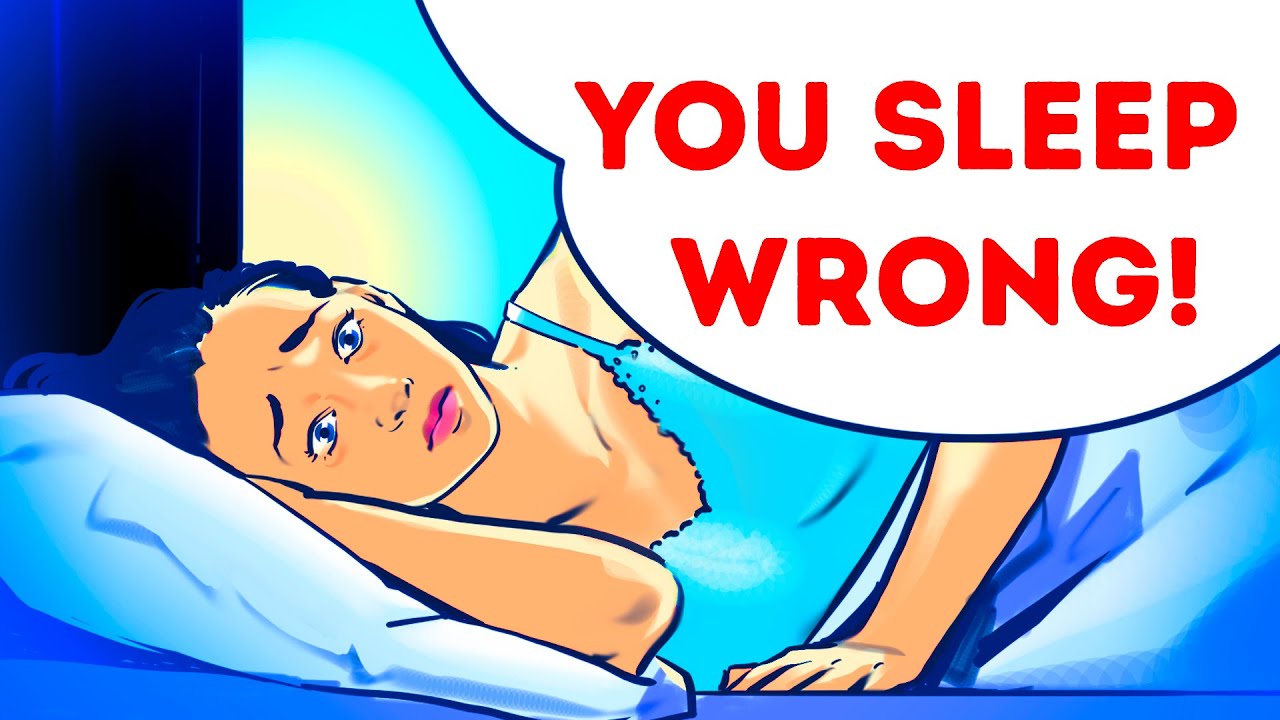What You Know About Sleep Is a Myth
The process of sleeping is important to our well-being — and it’s super complicated! Sleep deprivation can lead to serious health problems. Science is doing its best to find out what happens to our body and brain during sleep and what influences it in a positive or negative way. Thanks to these attempts, some well-known sleep myths have been debunked!
Other videos you might like:
I Decided to Sleep for 4 Hours a Day, See What Happened https://www.youtube.com/watch?v=lbFzL-0pEeU&
How to Fall Asleep in 2 Minutes According to the US Navy https://www.youtube.com/watch?v=g1CWinr5AkI&
12 Things to Know If You Like Sleeping Naked https://www.youtube.com/watch?v=qpjekNiiJK4
TIMESTAMPS:
What your body does while you sleep 0:32
Sleeping with your eyes open 1:21
How the moon affects your sleep 2:21
Nighttime noises 3:23
Get your gadgets out of sight 4:16
Long live power naps! 5:05
How to handle a sleepwalker 5:57
How much sleep do you really need? Conduct an experiment 6:34
Health risks of lack of sleep 7:14
Are early birds more successful in life? 8:02
Never hit the snooze button! 8:44
Music by Epidemic Sound https://www.epidemicsound.com/
SUMMARY:
– Your brain is pretty busy while you’re watching dreams. It consolidates all the information it’s received during the day and files it away for later use, creating long-term memories.
– Have you ever woken up and found that your eyes are much more sore and dry than usual? This actually happens to people who suffer from a condition called nocturnal lagophthalmos.
– Research by scientists at Basel University in Switzerland suggests that people actually sleep less during the full moon phase; it takes them longer to fall asleep, and they sleep less deeply.
– If you suffer from snoring, it might be a symptom of obstructive sleep apnea (OSA). When you have OSA, your airways become blocked, and you experience breathing pauses during nighttime rest.
– Sleep experts recommend turning off all gadgets one hour before bedtime. It’s much better to spend this time reading a book or doing some yoga, which will help your body to relax.
– A study conducted at Flinders University in Australia proved that mini naps (as short as 7–10 minutes) can boost alertness and help your brain function better.
– The best thing you can do is gently guide a sleepwalker back to bed. If it’s hard to do this, wake them with a loud noise.
– The truth is that the amount of sleep we need varies from person to person and from 6 to 9 hours. Some get by on a little less sleep; some require more sleep to feel refreshed in the morning.
– A lack of rest can increase the risks for high blood pressure and diabetes. And if that’s not enough, too little sleep also weakens your immune system’s defenses against the common cold and flu.
– When you delay getting up, you drift into a sleep cycle again. But a sleep cycle usually lasts from 75 to 90 minutes. When a second alarm goes off and interrupts it, you’re more likely to feel tired and groggy.
Subscribe to Bright Side : https://goo.gl/rQTJZz
—————————————————————————————-
Our Social Media:
Facebook: https://www.facebook.com/brightside/
Instagram: https://www.instagram.com/brightgram/
5-Minute Crafts Youtube: https://www.goo.gl/8JVmuC
Photos: https://www.depositphotos.com
East News
—————————————————————————————-
For more videos and articles visit:
http://www.brightside.me/



![[ID: Hx_A0iLhdr8] Youtube Automatic](https://bizimtube.com/wp-content/uploads/2021/03/id-hxa0ilhdr8-youtube-automatic-236x133.jpg)
![[ID: lp7w0UmpuIs] Youtube Automatic](https://bizimtube.com/wp-content/uploads/2021/03/id-lp7w0umpuis-youtube-automatic-236x133.jpg)
![[ID: s2-7T1TH-lY] Youtube Automatic](https://bizimtube.com/wp-content/uploads/2021/03/id-s2-7t1th-ly-youtube-automatic-236x133.jpg)
![[ID: b_lakC9M4UQ] Youtube Automatic](https://bizimtube.com/wp-content/uploads/2021/03/id-blakc9m4uq-youtube-automatic-236x133.jpg)
![[ID: r44yl6nPONs] Youtube Automatic](https://bizimtube.com/wp-content/uploads/2021/03/id-r44yl6npons-youtube-automatic-236x133.jpg)
![[ID: pAwto1YQjA8] Youtube Automatic](https://bizimtube.com/wp-content/uploads/2021/03/id-pawto1yqja8-youtube-automatic-236x133.jpg)
![[ID: XETG8azHiv4] Youtube Automatic](https://bizimtube.com/wp-content/uploads/2021/03/id-xetg8azhiv4-youtube-automatic-236x133.jpg)
![[ID: f3G_-S_2HUk] Youtube Automatic](https://bizimtube.com/wp-content/uploads/2021/03/id-f3g-s2huk-youtube-automatic-236x133.jpg)
![[ID: G8oWns54snA] Youtube Automatic](https://bizimtube.com/wp-content/uploads/2021/03/id-g8owns54sna-youtube-automatic-236x133.jpg)
![[ID: s0lIFXhu6aw] Youtube Automatic](https://bizimtube.com/wp-content/uploads/2021/03/id-s0lifxhu6aw-youtube-automatic-236x133.jpg)
![[ID: 4UTd2Ev8eYg] Youtube Automatic](https://bizimtube.com/wp-content/uploads/2021/03/id-4utd2ev8eyg-youtube-automatic-236x133.jpg)
![[ID: RKBGBjVJBxQ] Youtube Automatic](https://bizimtube.com/wp-content/uploads/2021/03/id-rkbgbjvjbxq-youtube-automatic-236x133.jpg)